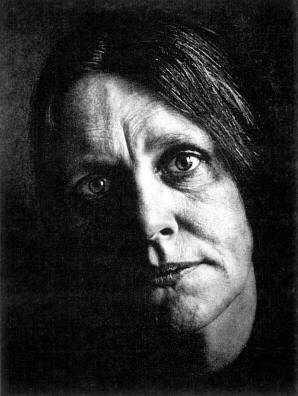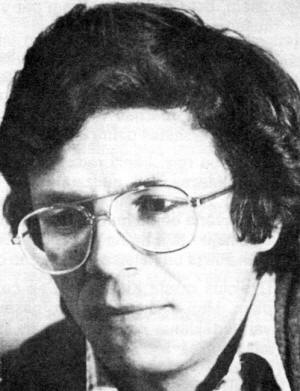Vizma Belševica
Vizma Belševica (* May 30, 1931 in Riga, † August 6, 2005 ibid ) was a Latvian poet, writer and translator.
Biography
The father of Vizma Belševica, Jānis Belševics, was a worker, her mother Ieva (born Cīrule ) housewife. With only one income and because of the alcohol problem of the father who had lost his baked goods company during the Great Depression of the Latvian economy, the family was poor. Vizma spent most of her childhood in Riga; the city is the subject of her work, but the time they spent on the small farm of their relatives in Courland ( Latvian Kurzeme ), in their poems and texts plays a much larger role.
During the 1950s Vizma Belševica studied at the Moscow Maxim Gorki Institute literature. Her first book of poems appeared in 1955. Their early works showed itself Communist influenced later she distanced herself, however. In the 1960s, their reputation in the Latvian SSR subsided because she refused to adapt their writing of Soviet literary doctrine. The collection of poems Jūra deg ( " The sea is burning " ) came out in 1966. Particularly with the poem " asides Henry the Latvians in the Livonian Chronicle ", published in the tape Gadu gredzeni ( " annual rings ", 1969), she created major problems. The above-mentioned chronicle dates from the early 13th century, when the German Livonian Order conquered Livonia; parallels to the Soviet occupation of Latvia were - even for political censorship - unmistakable. A series of reprisals were the result: Belševica could not publish nearly eight years long, and she was expelled from the Writers' Union of the Latvian SSR.
She used the forced sleep, among other things, Shakespeare, Hemingway, Pushkin and Ukrainian literature, but also Milne Winnie-the- Pooh translate. After the lifting of the publication ban on new collections of poems came out until 1987, the son Vizma Belševicas, the poet Klāvs Elsbergs, under mysterious circumstances was killed. He fell from a building of the Writers' Union; maybe it was a political murder, which should also meet Belševica. Then she fell silent at first; in 1995 she published the first volume of the autobiographical trilogy " Bille ".
Belševica worked with simple, high-contrast images of great symbolic power. In her poems and short stories, nature in all its forms, including maternity and the role of women plays a big role. The texts that passed the censors, have been translated and disseminated in the Soviet Union and abroad.
Through a newly independent Latvia they learned recognition: On December 6, 1990, she was elected an honorary member of the Latvian Academy of Sciences. She was twice the Spidola Prize, the highest recognition in the field of Latvian literature, next to the highest decorations of Latvia, the Three - Star Order, excellent. In 1998, she shared with Knuts Skujenieks the then first-ever Tomas Tranströmer Prize. Vizma Belševica was after 2000 again as a contender for the Nobel Prize in Literature in conversation, most recently in 2004. On August 6, 2005, she died after a long illness, due to which she was recently confined to a wheelchair, in Riga.
Bibliography (selection)
German
- Pielbeerbaum in the fall and other stories. Translated from Latvian by May Redlich, Eva -Maria Eussler, Andreas Ludden and Charlotte Torp. Hanover, Hirschheydt 1984. ISBN 3-7777-0054-1.
- Only because of the crazy Pauline ( Tas Dullas Pauline del ). In: Anne Hussel (ed.): How porcelain is broken. 40 love stories. Verlag Volk und Welt, Berlin 1987. ISBN 3-353-00189-1. Pp. 55-67.
Latvian
- " Visu ziemu šogad Pavasaris " (1955) poems
- " Zemes siltums " (1959) poems
- " Ķikuraga stāsti " (1965) short stories
- " Jūra deg " (1966) poems
- " Gadu gredzeni " (1969) poems
- " Madaras " (1976) poems
- " Nelaime Maja " (1979) stories
- " Kamola tinēja " (1981)
- " Ceļreiz ceļš uz pasaciņu " (1985) Two Pieces for Children
- " Dzeltu laiks " (1987) poems
- " Zem Zilas debesu bļodas " (1987 ) Fairy Tales
- " Ievziedu aukstums " (1988 ) Selected Poems
- " Baltās paslēpes " (1991) Love Poems
- " Bille. Trilogija " ( Autobiographical novel trilogy ) " Bille " (1992 USA, 1995 Latvia)
- " Bille un Kars " ( original title: " Bille dzīvo Talak " ) ( 1996)
- " Bille skaista Jauniba " (1999)
Translations
- " Dante Alighieri: Vita Nuova " (1965, with Jānis Liepiņš )
- " Atdzeja " (2004) adaptations










